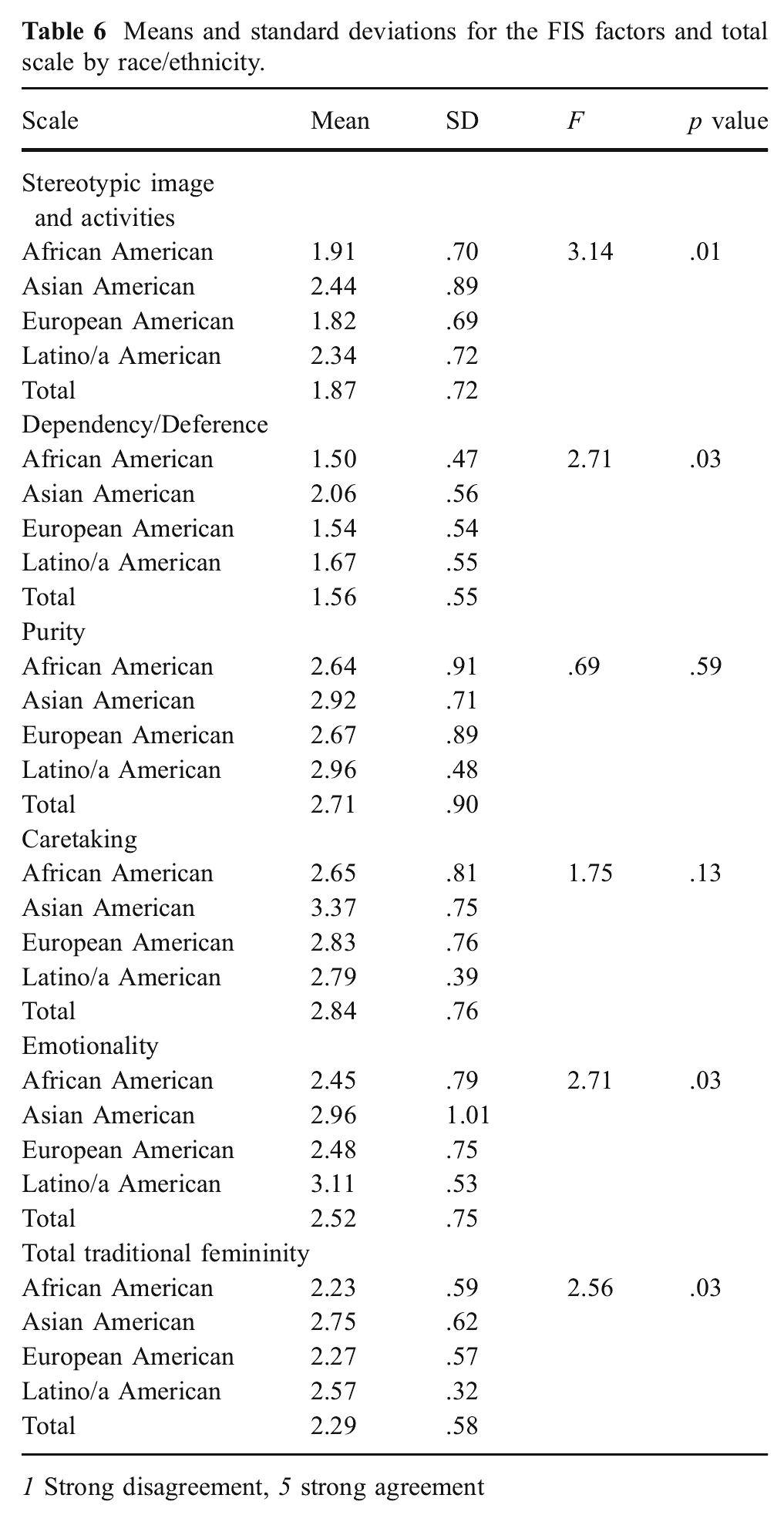女性特质观念量表(Femininity Ideology Scale)
The Femininity Ideology Scale is designed to assess the degree to which respondents endorse traditional femininity ideology (beliefs about how women should act). The measure contains 45 normative statements to which participants indicate their agreement or disagreement on a 5-point-Likert-type scale, where a score of 1 would represent strong disagreement with traditional norms and a score of 5 would represent strong agreement with traditional norms. There are five factors derived from a principle components analysis. For the current study, the number of items for each factor and alphas were: Stereotypic Image and Activities, 11, .89; Dependence/Deference, 10, .83; Purity, 9, .85; Caretaking, 7, .80; and Emotionality, 5, .82. For the total scale, the alpha was .93.
To obtain factor scores, first compute a raw score by adding up the scores on the items for that subscale and then divide the raw score by the number of items for that subscale. To obtain the Total Traditional Score, add up the raw scores on the five traditional factors and divide by 45.
Factor 1: Stereotypic Images and Activities
- Women should have large breasts.
- A woman should have a petite body.
- Women should have soft voices.
- A woman should wear attractive clothing, shoes, lingerie and bathing suits, even if not comfortable.
- It is unlikely that a pregnant woman would be attractive.
- A girl should be taught how to catch a husband.
- It is expected that a woman who expresses irritation or anger must be going through P.M.S.
- Girls should not enjoy “tomboy” activities.
- It is more appropriate for a female to be a teacher than a principal.
- A woman should not be expected to do mechanical things.
- A woman should not show anger.
Factor 2: Dependency/Deference - Women should not want to succeed in the business world because men will not want to marry them.
- A woman should not expect to be sexually satisfied by her partner.
- A woman should not make more money than her partner.
- A woman’s worth should be measured by the success of her partner.
- A woman should not consider her career as important as a man’s.
- A woman should not be competitive.
- Women should have men make decisions for them.
- Women should act helpless to attract a man.
- A woman should not marry a younger man.
- A woman should not initiate sex.
Factor 3: Purity - Women should not read pornographic material.
- A woman should remain a virgin until she is married.
- It is not acceptable for a woman to masturbate.
- A woman should not tell dirty jokes.
- A woman should not swear.
- A woman should not have a baby until she is married.
- A woman should be dependent on religion and spirituality for guidance.
- Women should dress conservatively so they do not appear loose.
- If a woman chooses to have an abortion, she should not feel guilty.
Factor 4: Caretaking - An appropriate female occupation is nursing.
- When someone’s feelings are hurt, a woman should try to make them feel better.
- A woman should know how people are feeling.
- Women should be gentle.
- A woman’s natural role should be the caregiver of the family.
- A woman should be responsible for teaching family values to her children.
- A woman should be responsible for making and organizing family plans.
Factor 5: Emotionality - It is expected that a women will be viewed as overly emotional.
- It is expected that women will have a hard time handling stress without getting emotional.
- It is expected that women in leadership roles will not be taken seriously.
- It is expected that a single woman is less fulfilled than a married woman.
- It is expected that a women will engage in domestic hobbies such as sewing and decorating.
- It is likely that a woman who gives up custody of her children will not be respected.
- It is expected that women will discuss their feelings with one another.
- It is expected that women will not think logically.

被试主要是European American。
参考文献:
Levant R , Richmond K , Cook S , et al. The Femininity Ideology Scale: Factor Structure, Reliability, Convergent and Discriminant Validity, and Social Contextual Variation[J]. Sex Roles, 2007, 57(5-6):373-383.

加入心理学网,获得更多
查找量表、在线测试、分享量表,可加微信:57762787;亦可 发文求助